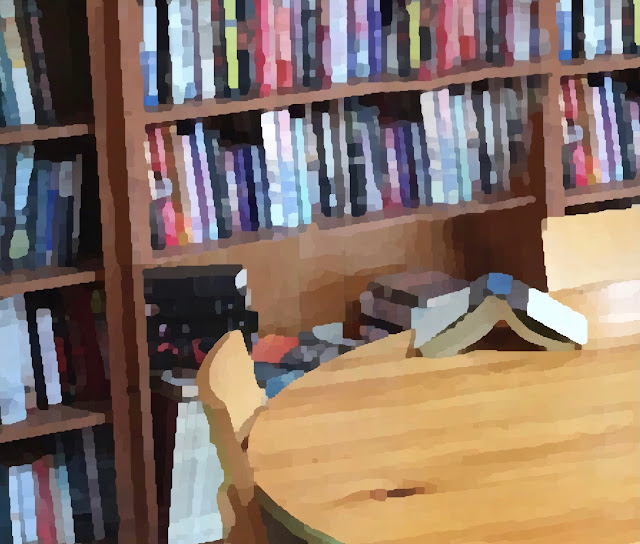I decided to elaborate more on a recent post I made for the feast of Saint Thomas Aquinas. There was a childhood memory of my mother that I wanted to place in a larger context. It pertains to this text:
I remember being four or five years old and my mother was folding the laundry and talking about the reading she was doing that was opening up her mind (and my mother had a huge, ardent, precise, and magnanimous mind). I have images in my memory from that conversation (and perhaps others): there were the two Popes (John XXIII and Paul VI) and the Council and somebody who had influenced her deeply but whose writings were confusing (that would have been the remarkable Jesuit paleontologist Pierre Teilhard de Chardin) but then a French Peasant who was a philosopher “corrected” her from going in the direction of the wild ideas that were brewing in 1960s “Teilhardism”… and, she was just learning so much. She radiated her still-youthful enthusiasm for truth and understanding.
And the four-year-old JJ was just imaging a French farmer-philosopher and whatever else and feeling that being Catholic and following the Church was not a narrow thing but an immense adventure of human reason and faith that embraced everything. Later I started noticing that wise old face of Jacques Maritain staring at me from the bookshelf on the spine of “The Peasant of the Garonne.” It was the radical beginning of my own intellectual vocation, and for many years (from childhood to age 58) it was an ongoing work that I shared with my brilliant mother. How grateful I am, and how much I miss her.
During those long-ago days, Mom was hardly confined to the laundry room of our apartment in Riverdale (northwest Bronx, NY). She had studied Chemistry in university and had an enduring fascination for the empirical sciences that served her well as a New York City public school Science teacher. She scaled back to being an “on-call” substitute teacher when my brother Walter and I came on the scene, but she continued her search for truth—especially in the area of the relationship between science and faith.
A voracious and intelligent reader, Mom first turned to Teilhard de Chardin (as did so many in those days) and was drawn to his arduous but confused efforts to articulate a Christ-centered scientific evolutionary cosmology. During his lifetime, this passionate scientist and devout Jesuit priest struggled to find words adequate for expressing his vast unprecedented vision for the synthesis of faith and scientific reason, but also humbly obeyed his Jesuit superiors who refused him permission to publish any of his speculative efforts in this area. Teilhard continued to grapple with his ingenious, powerful, perplexing, sometimes extreme intuitions until his death in 1955, accepting the continual rejections of his superiors as the will of Christ, as a suffering he was called to embrace. He also worked privately on his conjectural but (he was convinced) important thinking and writing projects, even in the face of the prospect that he might never be able to publish them.
Teilhard’s explorations have drawn attention to important problems, and may point toward a richer development of our understanding of the mystery of the Incarnation. They deserve (and have received, somewhat, over the years) careful and critical study by expert theologians who also have competence and training in the empirical sciences. Whatever Teilhard was up to at the time of his death, it was pretty clear that it required more work and some significant corrections. Time was needed for this work to be done in a sober manner, without excessive and premature enthusiasm.
But “the times they were a’changin…”🎶
After Teilhard de Chardin’s death, his many friends and colleagues published everything: Teilhard’s ideas—sometimes expressed in sweeping neologisms—hit the bookstores with all their raw poetic ardor for the progress of an evolutionary convergence of all things in the Cosmic Christ. But the actual face of Jesus of Nazareth and his redeeming death for our sins seemed to get a little lost in all the new terminology, much of which was ambiguous, incomplete, and—let’s be frank—just plain mistaken theologically (not to mention unverifiable scientifically). It goes without saying, of course, that these posthumous publications became wildly popular.
The “Teilhard de Chardin Fad” was launched onto the magical mystery tour of the psychedelic 1960s. But Mom never even got on that bus. Instead, she brought her fascination, her thoughts about faith and reason, her questions and her immense curiosity to the chaplain of the Newman Center at Hunter College. He listened to her patiently, and was able to discern the intellectual “meat” that my mother needed, and that she was ready for in her late 20s. He also realized that he only needed to recommend a few books, and Mom would construct her own “self-study.” He trusted that she would grow in her genuine intent to advance her intellectual life while remaining faithful to the Church’s magisterium (there were no graduate theology programs for lay students—much less lay women—in those days, but Mom would eventually earn her Master’s degree in theological studies in 1991). Without neglecting the other great thinkers of the era, this wise priest made sure that Mom would discover Saint Thomas under the direction of his most dynamic 20th century exponents. Mom read these books and acquired more of them. And she shared her great learning adventure—her growth in the knowledge of the truth—with me.I will always be grateful to Msgr. Herman Heidi (and my mother) for the fact that GIANTS occupied the bookshelves of my childhood home. Romano Guardini. Henri de Lubac. Jean Danielou. Others too. And, of course, the old peasant Jacques Maritain—lots of Maritain, but always in my memory the face of the (then) octogenarian hermit who went to live on the Garonne river with the Little Brothers of Jesus after his beloved wife Raissa died.

